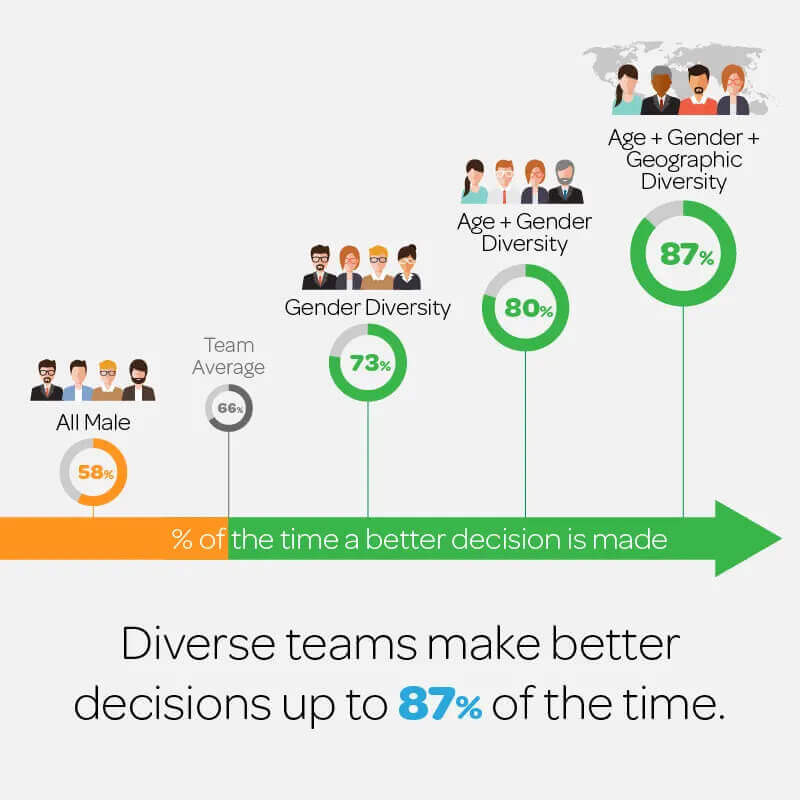- Investing in DE&I fosters a heterogeneous collective intelligence, enhancing creativity and openness
- Bringing people together enhances collective intelligence and performance, but only if the team is heterogeneous enough
- A sector approach makes it possible to share specific practices and enable specific solutions that will accelerate progress
Every quarter, the TriFinance Business Unit Financial Institutions gathers its consultants to discuss a specific topic. Last meeting, we discussed “Advancing Diversity, Equity, and Inclusion (DEI) in the Financial Sector”.
During the session, two guest speakers shed light on emerging trends at within the sector: Claire Godding, Senior Expert Manager Febelfin, and Gaëlle De Baeck, International Sustainability Lead TriFinance/TriHD.
Throughout the session, they explored the pivotal role diversity plays in driving innovation, fostering creativity, and enhancing decision-making within financial institutions. They shared valuable perspectives, underscoring the need for continuous evolution.
Why investing in DE&I is (still) needed
While investing in DE&I is often considered a potential burden, evidence shows that it enhances business health. A diverse workforce fosters a heterogeneous collective intelligence, enhancing creativity and openness. It encourages people to step out of their comfort zone, increasing the innovative capacity of an organization.
A diverse workforce fosters a heterogeneous collective intelligence, enhancing creativity and openness.
Moreover, diversity improves risk management and ethics. In contrast, homogeneous groups tend to underperform compared to heterogeneous groups. Management teams composed exclusively of men would lead to a reduction in risk mitigation measures, for example.
Different dynamics
Wo.Men in Finance, a consortium of all major Belgian financial institutions, has surveyed how men and women think about specific workplace situations. The preliminary results suggest that men feel more appreciated for expressing diverse opinions while women, more than men, tend to imitate behavior less natural to them. These results show the distinct experiences of men and women within a corporate environment (Wo.Men in Finance, March 2022, Survey Corporate Culture and Career M/F/X).
Multicultural Bankers identified cultural backgrounds as a hurdle, citing unconscious biases, microaggressions, and a lack of role models. Regarding sexual orientation, a Febelfin survey revealed that although 70% of LGBTQIA+ employees are "out" at work, 25% still feel only "partially" out, leading to ongoing stress and a perpetual dilemma for this group (Febelfin on LinkedIn, 2023).
How diversity influences decision-making
Next to innovation and risk management, diversity has a positive impact on decision-making. Teams with a diversity of age, gender, and geographic diversity, make better decisions up to 87% of the time compared to all male teams. By bringing people together and thus enhancing collective intelligence, performance has been shown to go up, but only if the team is heterogeneous enough.

People tend to act differently when interacting with a diverse audience as opposed to one with which they identify. A diverse team encourages people to step out of their comfort zone. It avoids decisions being biased by excluding a part of the population. Think about age, for example. For instance, environments predominantly occupied by men may demonstrate a greater aversion to risk and exhibit biases in decision-making. Environments with a higher concentration of women are shown to have fewer fraud cases.
A sector approach
Febelfin and Wo.Men in Finance opt for a sector approach because the financial sector contains a similar mix of gender, age, and origins. A sector approach also makes it possible to share specific practices and enable specific solutions that will accelerate progress. Moreover, peer pressure often pushes progress.
Over the last few years, several initiatives have emerged in the financial sector. Wo.Men in Finance, for example, aims to assist and inspire organizations in building an inclusive sector with equal opportunities for everyone. The organization is raising awareness of gender equality specifically.
A sector approach makes it possible to share specific practices and enable specific solutions that will accelerate progress.
The Multicultural Bankers organization focuses more on cultural diversity. They have developed a pledge for institutions and employees to formalize their commitment to enhancing diversity.
The website Inclusion In Finance (www.inclusioninfinance.be) provides context for specific terms such as “unconscious bias” and what an inclusive workplace looks like. It also provides several tools to enhance diversity at work.
Our perspective
At TriFinance/TriHD, the gender population is nicely balanced with around 45% of its workforce being women, and 37,5% of leadership roles occupied by females. We are a relatively young company, with over half its workforce between 26 and 35 years old.
TriFinance/TriHD is committed to continuing its efforts to enhance DE&I in the company. We are working together with EcoVadis to regularly assess how we’re doing regarding sustainability and CSR, and what actions we can take to do even better. EcoVadis has awarded us a bronze medal for our efforts so far.
Resources
- Febelfin, Diversity & Inclusion
- Febelfin, Multicultural bankers
- Multicultural bankers
- Febelfin, FA*Q, Ebook on inclusion
- Corinne Post, Boris Lokshin, and Christophe Boone, Harves Business Review, June 2021, Research: Adding Women to the C-Suite Changes How Companies Think
- Scott Berinato, Harvard Business Review, May 2021, Banks with More Women on Their Boards Commit Less Fraud
- Erik Larson, Forbes, 2017, New Research: Diversity + Inclusion = Better Decision Making At Work
- Wo.Men in Finance, 2022, Annual report
- Wo.Men in Finance, March 2022, Survey Corporate Culture and Career M/F/X
- Wo.Men in Finance, June 2022, Preliminary results survey
Related content
-
Blog
Behind the scenes of a Best Workplace: Curiosity and authenticity as the power of connection at TriHD
-
Blog
Building a career in payroll: skills, roles and development opportunities
-
Article
Maaike’s growth story: “I didn’t choose payroll, payroll chose me.”
-
Blog
The furthering story of Alex: from recruitment to consultancy
-
Blog
We’re Best Workplace 2025™!
-
Blog
Europe's green deal turns pale